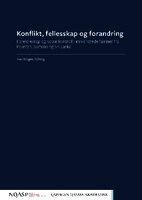Konflikt, fellesskap og forandring
Foreldreskap og sosial kontroll i innvandrede familier fra Pakistan, Somalia og Sri Lanka
| dc.contributor.author | Friberg, Jon Horgen | |
| dc.date.accessioned | 2020-01-29 11:04:16 | |
| dc.date.accessioned | 2020-04-01T09:09:23Z | |
| dc.date.available | 2020-04-01T09:09:23Z | |
| dc.date.issued | 2019 | |
| dc.identifier | 1006895 | |
| dc.identifier | OCN: 1147283142 | |
| dc.identifier.uri | http://library.oapen.org/handle/20.500.12657/23261 | |
| dc.description.abstract | "In recent years, organizations and authorities in Norway have put a critical spotlight on parenting practices among non-Western immigrants, based on a concern for young people's autonomy and self-determination. The purpose of this book – which deals with parenting and social control in immigrant families from Pakistan, Somalia and Sri Lanka – is to shed light on on this collision between different family norms and practices from different perspectives, and thus help to understand why family relations and social control have become a topic of contention in today's multicultural Norway. The books starting point is a sociological perspective on cultural differences, social control and change in a migration context. A key point of focus in the empirical analyzes are parental restrictions in young people's social life. How common are such restrictions within different groups? What significance do factors such as religiosity and socio-economic resources play in the exercise of social control? And what are the consequences for children's social participation, mental health and well-being? One aim is to contribute systematic quantitative knowledge on such issues. At the same time, the book contributes to a more qualitative understanding of people’s experiences and actions. How do parents from countries like Pakistan, Somalia and Sri Lanka experience raising children and young people in Norway? What concerns have they had regarding their children’s encounters with various parts of Norwegian society? And how do young people navigate between different expectations and demands from the families and communities on the one hand and among their peers and the larger society on the other? We focus on the question of social change. Is the organization of family relationships and the exercise of social control within immigrant populations characterized by continuity or change? And what kind of mechanisms drive such changes forward? The book, which is published as part of the Children of Immigrants Longitudinal Study in Norway, will illuminate these questions using quantitative data from a comprehensive survey of 16-17 year olds in Oslo and Akershus, as well as qualitative interviews – individually and in groups – with parents, adolescents and young adults with immigrant backgrounds as well as people in public help services and NGOs. " | |
| dc.language | Norwegian | |
| dc.subject.classification | thema EDItEUR::J Society and Social Sciences::JB Society and culture: general::JBF Social and ethical issues::JBFH Migration, immigration and emigration | en_US |
| dc.subject.classification | thema EDItEUR::5 Interest qualifiers::5P Relating to specific groups and cultures or social and cultural interests::5PB Relating to peoples: ethnic groups, indigenous peoples, cultures and other groupings of people::5PBC Relating to migrant groups / diaspora communities or peoples | en_US |
| dc.subject.classification | thema EDItEUR::J Society and Social Sciences::JH Sociology and anthropology::JHB Sociology | en_US |
| dc.subject.other | paranting practices | |
| dc.subject.other | non-Western immigrants | |
| dc.subject.other | social control | |
| dc.subject.other | Norway | |
| dc.subject.other | foreldrepraksis | |
| dc.subject.other | sosial kontroll | |
| dc.subject.other | innvandring | |
| dc.subject.other | foreldre | |
| dc.subject.other | foreldreskap | |
| dc.title | Konflikt, fellesskap og forandring | |
| dc.title.alternative | Foreldreskap og sosial kontroll i innvandrede familier fra Pakistan, Somalia og Sri Lanka | |
| dc.type | book | |
| oapen.abstract.otherlanguage | "Denne boka tar for seg foreldreskap og sosial kontroll i innvandrede familier fra Pakistan, Somalia og Sri Lanka. Hensikten er å belyse møtet mellom ulike familie- og oppdragelsesidealer fra flere sider, og slik bidra til å forstå hvorfor dette har blitt et hett stridstema i dagens flerkulturelle Norge. Boka tar utgangspunkt i et sosiologisk perspektiv på kulturforskjeller, sosial kontroll og endring i en migrasjonskontekst. Et siktemål er å bidra med systematisk kvantitativ kunnskap. Hvor utbredt er ulike typer strenge foreldrerestriksjoner i unges sosiale liv? Hvilken betydning spiller faktorer som religiøsitet, sosioøkonomiske ressurser og familiens botid i Norge for utøvelsen av sosial kontroll? Og hvilke konsekvenser har slike foreldrerestriksjoner for barnas sosiale deltakelse, psykiske helse og trivsel? Et annet siktemål er å bidra til en mer kvalitativ forståelse for hvorfor folk handler som de gjør. Hvordan opplever foreldre det å skulle oppdra barn og ungdom i det som for mange oppleves som et fremmed land? Hvilke bekymringer har de knyttet til ungdommenes møter med det norske samfunnet? Og hvordan navigerer ungdom mellom ulike forventninger og krav fra familie og storsamfunn? Sosial endring står sentralt. Er familierelasjoner og utøvelse av sosial kontroll innad i innvandrerbefolkningen preget av kontinuitet eller endring? Hva slags mekanismer kan eventuelt bidra til å drive endringer framover? Og i forlengelsen av dette – hvordan kan forskning og offentlig debatt bidra på en konstruktivt måte? Disse spørsmålene vil belyses ved hjelp av kvantitative data fra en omfattende spørreundersøkelse blant 16–17-åringer i Oslo og Akershus, samt kvalitative intervjuer – individuelle og i grupper – med foreldre, ungdom og unge voksne i de tre gruppene, samt med personer i organisasjoner, hjelpeapparat og førstelinjetjeneste." | |
| oapen.identifier.doi | 10.23865/noasp.75 | |
| oapen.relation.isPublishedBy | bf7b42a4-6892-42e3-aaf8-8f32c8470a8b | |
| oapen.pages | 167 | |
| oapen.place.publication | Oslo |

